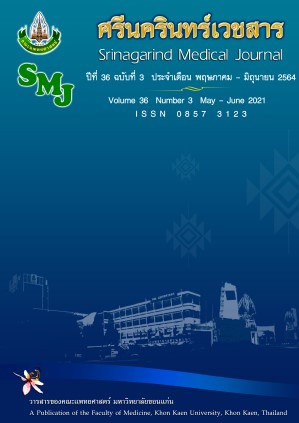Dysphagia Knowledge of Stroke Patients with Dysphagia
Keywords:
knowledge; stroke; dysphagiaAbstract
Background and objective: Dysphagia is a common condition in stroke patients which may result in complications such as aspiration pneumonia and malnutrition. Such complications can lead to prolonged hospitalization or death. Proper management of dysphagia by the medical personnel, including the knowledge and understanding about dysphagia of the patient and caregivers, can play an important role in complication prevention. Therefore, the researchers aimed to study the level of dysphagia knowledge among stroke patients with dysphagia.
Methods: A cross-sectional study was conducted among 95 dysphagia stroke patients who were admitted to the rehabilitation clinic, Srinagarind hospital. Demographic data were retrieved from all participants. Dysphagia knowledge was assessed by using questionnaires, which consisted of the following questions: 1) general knowledge 7 items, 2) complications prevention 8 items, and 3) rehabilitation 5 items. Then, dysphagia knowledge was categorized into 3 levels based on the total scores of each participant (full 20 points); low (1-7 points), moderate (8-14 points) and high (15-20 points). The data were analyzed using descriptive statistics.
Results: Of 95 participants, 26%, 56% and 18% of dysphagia patient had low, moderate and high level of dysphagia knowledge, respectively. The average score of general knowledge, complication prevention and rehabilitation were 4.32 ± 2.73, 3.64 ± 2.86 and 1.52 ± 0.42, respectively
Conclusions: Most stroke patients with dysphagia had dysphagia knowledge at a moderate level. Whereas the score in prevention and rehabilitation domain were low.
References
2. Han TR, Paik NJ, Park JW. Quantifying swallowing function after stroke: A functional dysphagia scale based on videofluoroscopic studies. Arch Phys Med Rehabil 2001; 82(5): 677–82.
3. González-Fernández M, Daniels SK. Dysphagia in stroke and neurologic disease. Phys Med Rehabil Clin N Am 2008; 19(4): 867–88.
4. Wattanapan P, Kovindha A, Permsiripanich W, Manimmanakorn N, Kuptniratsaikul V. Swallowing Problem in patients with stroke: multi-center study in Thailand. J Med Assoc Thai 2016; 99 (Suppl 7): s76-80.
5. ภัทรา วัฒนพันธุ์. การฟื้นฟูสภาพการกลืน. 3rd ed ขอนแก่น หจก. โรงพิมพ์คลังนานาวิทยา; 2562: 242.
6. Galvan TJ. Dysphagia: going down and staying down. Am J Nurs. 2001; 101(1): 37–42; quiz 43.
7. Al-Khaled M, Matthis C, Binder A, Mudter J, Schattschneider J, Pulkowski U, et al. Dysphagia in patients with acute ischemic stroke: Early dysphagia screening may reduce stroke-related pneumonia and improve stroke outcomes. Cerebrovasc Dis Basel Switz 2016; 42(1–2): 81–89.
8. Eltringham SA, Kilner K, Gee M, Sage K, Bray BD, Pownall S, et al. Impact of dysphagia assessment and management on risk of stroke-associated pneumonia: A Systematic Review. Cerebrovasc Dis Basel Switz.2018; 46(3–4): 99–107.
9. Rhoda A, Pickel-Voight A. Knowledge of nurses regarding dysphagia in patients post stroke in Namibia. Curationis 2015; 38(2): 1564.
10. Pierce LL, Steiner VL, Khuder SA, Govoni AL, Horn LJ. The effect of a Web-based stroke intervention on carers’ well-being and survivors’ use of healthcare services. Disabil Rehabil 2009; 31(20): 1676–1684.
11. Junkhaw T, Munisamy M, Samrongthong R, Taneepanichskul S. Factors associated with health literacy in suburban Bangkok Type 2 Diabetics (T2DM): a cross-sectional survey. J Med Assoc Thai 2019; 102(7): 809–815.
12. Xie Y, Ma M, Zhang Y, Tan X. Factors associated with health literacy in rural areas of Central China: structural equation model. BMC Health Serv Res 2019; 19(1): 300.
13. เรณู มูลแก้ว, ประทุม สร้อยวงค์, จินดารัตน์ ชัยอาจ. ประสิทธิผลของการใช้แนวปฏิบัติทางคลินิกสำหรับการจัดการอาการกลืนลำบากในผู้ป่วยโรคหลอดเลือดสมอง. วารสารการปฏิบัติการพยาบาลและการผดุงครรภ์ไทย 2559; 3(2): 44–57.
14. วันวิสา คำสัตย์, รุ้งระวี นาวีเจริญ. ผลของกิจกรรมการพยาบาลโดยการสอนแนะต่อการกลืนของผู้ป่วยโรคหลอดเลือดสมองชนิดขาดเลือดที่มีภาวะกลืนลำบาก. วารสารแพทย์นาวี 2559; 43(3): 17–35.




